Ajith Francis is the Senior Manager, Policy Programs, of the Secretariat of the Internet & Jurisdiction Policy Network. In his role, he manages the policy development work of stakeholders in the three thematic Programs of the organization. Prior to joining the Secretariat, Ajith was a consultant at the Government of India Planning Commission’s ‘India Backbone Implementation Network’. Working for this intra-governmental startup, he coordinated stakeholder groups to help reform the process of developing and implementing India’s policy plans. Ajith was also a Digital Marketing Account Planner at Google Inc. and gained experiences at UN Environment. He graduated from Sciences Po Paris with a Master’s in Public Policy specialising in Economics and Technology Policy, and is an avid Quizzer and sports enthusiast.
Faculty and resource persons AfriSIG 2021
Ajith Francis

Alison Gillwald

Alison Gillwald (PhD) is the Executive Director of Research ICT Africa (RIA) an African digital policy and regulatory think-tank that works across 20 African countries. She is also adjunct- professor at the University of Cape Town’s Nelson Mandela School of Public Governance where she supervises doctoral students undertaking transdisciplinary research in digital policy regulation and data governance. A former regulator she was appointed to the founding Council of the South African Telecommunications Regulatory Authority (SATRA) in 1997, having headed the policy department at the first broadcasting regulator, the Independent Broadcasting Authority established in 1994. She has advised the South African Presidency, the National Planning Commission, the Competition Commission and the Independent Communications Authority of South Africa, in addition to the African Union Commission, SADC, CRASA and the SADC Parliamentary Forum. She has been commissioned by the International Telecommunications Union, the World Bank and the African Development Bank to undertake research to inform policy across a number of Africa countries and collaborates with networks across the Global South to build evidence base for decision-makers. She is the deputy chairperson of Giganet, the international academic internet governance conference and was an inaugural associate editor of the ITU journal, Discoveries.
Allan Mulenga
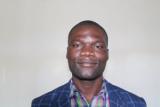
A highly motivated and results driven Law Enforcement Officer with enormous knowledge and skills in information technology, digital forensic, fraud and cyber security spanning a period of more than 14 years. Extensive knowledge in database management, information technology management, computer hardware/software, network technologies, forensic training, forensic auditing, private investigations, IT security, due diligence and information system audit. He holds a B.Sc Degree in Information Security and Computer Forensics, Diploma in Management of Information System (IMIS) coupled with other certifications in Cyber Security Management, Microsoft Certified Profession, Cisco CCNA, Digital Forensics and IT in Law Enforcement, Digital Forensic Investigator in using Mobile Forensic Master, Computer Hacking Forensic Investigations and certificate in Value Added Tax/Goods in Transit Fraud Investigations and Managing Finacial Investigations. He is an OECD 2021 Alumni in Managing Finacial Investigation and VAT/GST in Transit Investigation,Best Practice IGF-Cyber Security,Afrisg 2019 Alumni.my hobby is watching football and always blue Chelseafc.
Anriette Esterhuysen
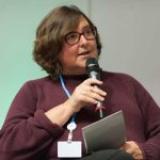
Anriette Esterhuysen was the executive director of the Association for Progressive Communications (APC) - the largest ICT-focused civil society network in the world - from 2000 to 2017. She continues to work with APC as a consultant and convenes the African School on Internet Governance (AfriSIG), a joint initiative of APC, the African Union Commission and Research ICT Africa.
Ms. Esterhuysen has served as Chair of the Multistakeholder Advisory Committee of the United Nations Internet Governance Forum. as well as on the African Technical Advisory Committee of the United Nations Economic Commission for Africa's African Information Society Initiative (1996-1999), the United Nations ICT Task Force (2002-2005), the World Summit on the Information Society (WSIS) Working Group on Financing Mechanisms (2003-2005), the Commission on Science and Technology for Development Working Group on Internet Governance Forum (IGF) Improvements (2011-2012) and on Enhanced Cooperation (2017-2018), the Global Commission on Internet Governance and the Multistakeholder Advisory Group (MAG) of the IGF (2012-2014).
She was inducted into the Internet Hall of Fame as a Global Connecter in 2013 and received an EFF Pioneer Award in 2015. Ms. Esterhuysen serves as a Commissioner on the Global Commission on the Stability of Cyberspace and as a member of the board of directors of the .ZA (South Africa) domain name authority, ZADNA.
Avri Doria

Avri Doria is a research consultant with a number of contracts with both NGOs and the technical community. She served on the UN Working Group on Enhanced Cooperation I (WGEC) and the UN Working Group on Internet Governance (WGIG). She served as a member the Internet Governance Forum (IGF) Secretariat and was a member of the IGF Multistakeholder Advisory Group (IGF MAG). As a technologist she has been involved in the development of Internet protocols and architectures for over 30 years; is co-chair of a Research Group on Human Rights Protocol Considerations and a member of the Internet Research Steering Group (IRSG). She has been active in ICANN policy, was chair of the GNSO Council and is currently a member of the ICANN Board. Avri was awarded the ICANN Multistakeholder Ethos award in 2014.
Barrack Otieno

Mr. Barrack Otieno serves as the General Manager of Africa Top Level Domains Organisation , the regional association of Country Code Top Level Domain Registries and Secretariat of the Africa Domain Name System Forum. He is also the current Chairman of the Board of Trustees of the Dot Africa Foundation as well as a trustee at the Kenya ICT Action Network a Policy Think tank. He was the founding president of the Internet Society Kenya Chapter, former secretariat of Africa Regional At Large Organization (www.afralo.org) the voice of Internet users from the African continent within the Internet Corporation for Assigned Names and Numbers. He is involved in local, regional and international standards development for the International Standards Organization (ISO 27000 series on Information Security Management) through the Kenya Bureu of Standards Technical Committee on IT Security which he chairs as a representative of the Computer Society of Kenya.
Bob Ochieng

Bob is a telecommunications Eng. with 10+ years’ experience in the multi-disciplinary Telecoms/ICT industry and Project Management. As the primary representative of the Internet Corporation for Assigned Names and Numbers (ICANN) in East and Southern Africa, Bob is charged with developing and executing the organization’s strategic and tactical objectives in the region including: Overseeing, leading and executing ICANN’s engagement in the region with all stakeholders, including governments, the academic, business and legal communities as well non-commercial interests; Monitoring, identifying and analyzing internet related developments, public policy issues and trends, and impact on strategy in the region translating these into practical plans.
Carlos Rey-Moreno
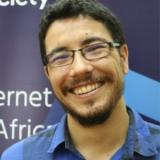
After working in providing connectivity to remote health care centres in Latin America, Carlos has devoted the last eight years to studying, developing and supporting community networks around the world. As part of his PhD he co-founded Zenzeleni Networks, and studied the main drivers that could make a community network in rural South Africa sustainable and scalable. After obtaining his doctorate in 2015, he went and studied the common denominators across community networks in Africa, producing a seminal report on the topic, and co-organised the first five editions of the Summit on Community Networks in Africa. For the last four years, he has been with the Association for Progressive Communications (APC), where he co-leads its community networks initiative, overseeing projects in Latin America, Africa and Asia. He also coordinates its policy and regulatory work to create a more enabling regulatory framework for local operators and community networks. As part of that, he has provided training to regional regulatory associations and policy makers in Africa, authored reports and written submissions to public consultations on the topic, and participated frequently as speaker and convener in internet governance and similar telecommunications policy forums.
Chengetai Masango

Dawit Bekele

Dr. Dawit Bekele is the Regional Vice President-Africa of the Internet Society, an organization that works for an open, globally connected and secure Internet for everyone.He is an Ethiopian citizen living in Addis Ababa. He received undergraduate, Masters and Ph.D. degrees from Université Paul Sabatier in France, all degrees in Computer Science. He also holds a master’s in business leadership from University of South Africa. Prior to joining Internet Society, Dr. Dawit worked at Addis Ababa University on teaching and research positions in computer science. He also started and ran a private company forIn ternet-related services for a number of years.
Enrico Calandro

Enrico Calandro (PhD) is the Project Leader with the EU-funded Project Cyber Resilience for Development (Cyber4Dev), a flagship cyber capacity-building programme of the European Commission.
As a research associate at Research ICT Africa, he has conducted digital policy and regulation research to facilitate evidence-based and informed policy making for an improved, rights-based and secure access, use and application of digital technologies in Africa and beyond.
As the co-founder and co-director of the Cybersecurity Capacity Centre for Southern Africa at the University of Cape Town, he has led initiatives to deploy the Cyber Maturity Model for Nations in Africa.
Ephraim Percy Kenyanito
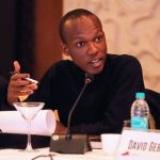
Ephraim is a trained lawyer, a Certified Project Management Professional (PMP – PMI USA), and an Associate of the Chartered Institute of Arbitrators (the UK and Kenya) and a Certified Professional Mediator (MTI East Africa), with over nine years in the African and global International Trade, Technology, Media and Telecommunications industry.
Between 2014 and 2018 he served as the youngest advisor on Internet Governance to two UN Secretary Generals: Ban Ki–moon and António Guterres. Additionally, since 2012 he has executed international development projects with a diverse range of leading international institutions across 46 African Union member countries and served as an Independent Expert to two ICANN Implementation Advisory Groups.
Presently, Ephraim does research on the nexus of Digital Infrastructures, Digital Trade, Electronic Commerce and Data Protection and Open Data with an international institution, ARTICLE 19. He is also a member of the GFCE Advisory Board, Digital Peace Now, Siasa Place, European Commission GIPO advisory group among other board positions. He is also a full member of the International Association of Privacy Professionals (IAPP), the Project Management Institute (PMI) and Pan African Lawyers Union (PALU).
Felicia Anthonio

Felicia Anthonio is a Campaigner and #KeepItOn Lead at Access Now, an international not-for-profit organization with a mission to extend and defend digital rights of users at risk. The #KeepItOn Campaign, is a global initiative that unites over 240 organizations working to fight against internet shutdowns worldwide. She is passionate about monitoring, tracking and documenting internet shutdowns and their impact on human rights. Before joining Access Now, she was a Programme Associate at the Media Foundation for West Africa (MFWA) where she coordinated the African Freedom of Expression Exchange (AFEX). She is a 2019 Fellow of the African Internet Governance School (AfriSIG). She holds an M.A. in Lettres, Langues et Affaires Internationales from l’ Université d’Orléans, France and a B.A in French and Psychology from the University of Ghana. She love cooking (favourite food is Ghana Jollof rice) and hanging out with my friends.
Fiona Alexander

After nearly 20 years with the U.S. government at the National Telecommunications and Information Administration, she is now teaching at American University in Washington, DC and co-founded a tech policy and strategy consulting firm. Most days she can be found hanging out with her little dog Fred, who often makes an on camera appearance.
Frane Maroevic

Frane Maroevic is the director of the Content and Jurisdiction Program of the Internet and Jurisdiction Policy Network. He has over 20 years of extensive experience in international relations, media and governance. Most recently, he worked on freedom of expression and media freedom as the director for the Organization for Security and Cooperation in Europe (OSCE) Representative on Freedom of the Media (2015-2019), where he participated in key internet governance processes. Frane joined the OSCE in 2010 as its deputy spokesperson. From 1999 to 2007 he worked in Bosnia and Herzegovina as the spokesperson for the European Commission and then as the Director of Communications for the High Representative/EU Special Representative (2007-2010). Frane started his career in journalism at the BBC World Service in London (1992-1999).
Gayatri Khandhadai

Gayatri Khandhadai is a lawyer with a background in international law and human rights, international and regional human rights mechanisms, research, and advocacy. She previously worked with national and regional human rights groups, focusing on freedom of expression. Her current focus is on digital rights and policy in Asia with specific emphasis on freedoms of expression, religion, assembly and association on the internet.
Gbenga Sesan

‘Gbenga Sesan is the Executive Director of Paradigm Initiative, a pan-African social enterprise working on digital inclusion and digital rights through its offices in Cameroon, Kenya, Nigeria, Senegal, Zambia and Zimbabwe. He is also a Non-Resident Fellow at the Digital Civil Society Lab at Stanford University. Originally trained as an Electronic & Electrical Engineer at Obafemi Awolowo University, he completed Executive Education programs at Lagos Business School, Oxford University, Harvard University, Stanford University, Santa Clara University and University of the Pacific. ‘Gbenga’s consulting experience includes assignments completed for numerous institutions, including Microsoft, Harvard University and United Nations agencies, among others, in over 30 countries. A Schwab Foundation Social Entrepreneur of the Year and former member of the United Nations Committee of eLeaders on Youth and ICT, he is a CyberStewards Fellow, Crans Montana Forum Fellow, Archbishop Desmond Tutu Leadership Fellow, Ashoka Fellow, Our Common Future Fellow and Cordes Fellow.
Karim Attoumani

He's the Director of Regulation & HSE at Telecom Comores SA. Graduated in Telecom Engineering, with a Master in ICT Regulation and a Master degree in Integration of ICT in Education. He's involved in the development of ICT sector in Comoros for more than 15 years, specifically for the effective liberalisation of the ICT sector. His professional career extends from the Universities of Antananarivo and Comoros as Professor, IT Assistant at UNICEF Comoros, Head of departments at ICT Regulatory Authority, Coordinator of a WB program on infrastructures development and the establishment of a competitive ICT environment in Comoros, COMESA IT Technical Committee focal point, ITU Indicators and Statistics Consultant, Governmental Advisory Committee (GAC) for Comoros at ICANN, WSA Expert for Comoros, Global integrity evaluator for Comoros Member of African School on IG alumni, IG trainer with the PRIDA project, UN MAG IGF member, VP at ISOC Chapter Comoros.
Koliwe Majama

Koliwe Majama is a Zimbabwean media, information, communications and technologies consultant with over 15 years of experience working in civil society lobbying and advocacy. As a trained journalist with a diploma in Journalism and Mass Communication, Koliwe has practiced as both a print and broadcast journalist in Zimbabwe. She also holds a Masters in Public policy and governance, a BSc in Media and Society Studies and is an AfriSIG alumnus. In the region and globally, Koliwe is invested in networking and thought leadership on varying internet governance trends, including gender and the internet – which she has a passion for. Currently, Koliwe works with the Association for Progressive Communications (APC) the AfriSIG organiser and Coordinator of the African Declaration on Internet and Freedoms Coalition.
Kudakwashe Tinaye Hove
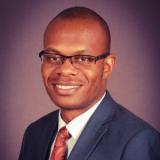
Kudakwashe Hove is Legal and Digital Policy Lead at the Media Institute of Southern Africa, Zimbabwe Chapter. Kuda leads his organisation’s work on digital policy in Zimbabwe and the Southern African region. He is also tasked with information and communications technologies sectors engagement to foster the exercise and enjoyment of freedom of expression, digital rights, and the right to information. Kuda develops and delivers strategic legal interventions under the Media Defence Fund in the promotion and protection of freedom of expression and the right to information in Zimbabwe.
Leonid Todorov
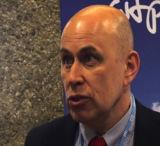
Leonid Todorov holds an M.A. in Linguistics and did postgraduate studies in international relations, management and business leadership, and economics in Denmark, Taiwan and US. Since the onset of the Russian reforms, he served for more than a decade as Chief of Staff to PM of Russia. His background also includes private sector and academic activities. In 2008, he joined the .RU registry and contributed to the launch of the IDN ccTLD .РФ and some new gTLDs . ДЕТИ (kids) and .TATAR. In 2015, he was appointed as General Manager of the Asia Pacific Top Level Domain Association (APTLD). He also helped establish the Russian IGF and contributed to EuroDIG and APrIGF, and sits on CCNSO SOP Committee. His focus is on ccTLDs, Internet governance, public policy, and cybersecurity. He has authored and coauthored a number of publications on these issues, and presented at various national and international events.
Margaret Nyambura Ndung’u

Margaret Nyambura Ndung’u is an Information Scientist with over 20 years’ experience in the digital space. Her current fields of interest are internet governance, cyber diplomacy, cybersecurity, gender equity and sensitivity in the digital space, and child online safety. She advocates for meaningful and affordable connectivity for all, accompanied by balanced awareness creation of the pros and cons of digital presence, for a real inclusive and progressive digital transformed society for sustainable social-economic development.
Dr. Ndung’u received her PhD in computer science from the University of Nairobi in 2011. She is currently working as a Senior Regulatory and Internet Governance Expert for the Policy and Regulation Initiative for Digital Africa (PRIDA), a project of the African Union Commission and funded by the European Union.
Michael Ilishebo

Michael Ilishebo is a Law Enforcement Officer working as a Digital Forensic Analyst and Cyber Crime Investigator for the Zambia Police Service. Michael studied Information Technology at the Copperbelt University, Cyber Security and ICT Policy in the US and has undertaken various courses in Cyber Crime Investigations, Digital Forensics, Crypto Currency Investigations etc. He is currently a member of the African Union Cyber Security Expert Group (AUCSEG), ICANN Public Safety Working Group and also a Trainer in Cyber Crime Investigations under the SARPCCO / INTERPOL for Law Enforcement Officers in Southern Africa. Michael is an alumni of AFriSIG (2014)
Milton L. Mueller

Milton Mueller is Professor at the Georgia Institute of Technology (Atlanta, USA) in the School of Public Policy. He is an internationally prominent scholar specializing in the political economy of information and communication. The author of seven books and many journal articles, his work informs public policy, science and technology studies, law, economics, communications, and international studies. His books Will the Internet Fragment? Sovereignty, Globalization and Cyberspace (Polity, 2017), Networks and States: The global politics of Internet governance (MIT Press, 2010) and Ruling the Root: Internet Governance and the Taming of Cyberspace (MIT Press, 2002) are acclaimed scholarly accounts of the global governance regime emerging around the Internet.
Musab Isah
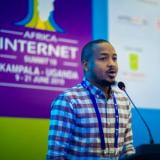
He's an Assistant Professor of Computer Science and Engineering at the University of Hafr Al-Batin, Saudi Arabia. He teaches courses in Data Science, Software Engineering and Computer Networks. Prior to his current role, he worked as a research engineer and data scientist at AFRINIC. He planned and delivered research projects focussed on different aspects of Africa’s internet from routing protocols to DNS to IPv6 adoption. He also travelled across Africa to deliver workshops and participated in internet fora and conferences with the drive to have a common understanding of technologies and policies that are vital in ensuring that the vast majority of unconnected Africans are provided with cheap access to the Internet. He was also a Research Associate at the University of Cambridge and worked on the Architecture for an Internet for Everybody, or simply the RIFE project. RIFE was aimed at providing affordable internet access to those who could not afford it by solving the technological challenge to increase the efficiency of the underlying transport networks and the involved architectures and protocols. He also worked in a project to develop a new mobile web framework designed to revolutionise web access through significant reduction of the sizes of web pages in order to speed up web access especially for users in underserved areas. He's proud to say that the work they did contributed to the formation of the company GAIUS Networks.
Nashilongo Gervasius

Nashilongo Gervasius is a public policy researcher and media and communication practitioner having worked in the media and communication field in Namibia for the past 13 years. She is the founding President of the Internet Society Namibia Chapter and an Advisor to the Namibia National Working Group on Internet Governance Forum. She was recently appointed by the Namibian President to serve on the national 4IR Task force where she chairs the sub-committee on Infrastructure (ICT and Energy) and National Data. Her research interests include, data governance, data justice, digital policy and issues of inclusion. She is an Alumni of the Africa School of Internet Governance (AFRISIG) (2019) and a graduate fellow of the Open Internet Leadership Programme and as well as a Fellow/Connector of the UN Foundation +Plus Social Good promoting SDGs related to technology and innovations. Nashilongo currently a research fellow at Research ICT Africa and she holds a Masters in ICT and the Knowledge Society and has completed a Master of Science in Global Media and Communication student at the London School of Economics and Politics.
Pria Chetty

In her current position as the Regional Director of EndCode, she manages a team of advisors that consult developments in technology law and policy to advise clients including tech multinationals, tech start-ups, governmental and non-governmental organisations. She has an entrepreneurial nature on the one hand, excited by the challenge to develop and give life to new programmes, organisations and institutional capabilities; and a respect for governance and excellence on the other hand, with an eye for detail and responsible programme delivery within professional standards. She's an advocate for the potential of emerging technology to improve the lives of Africans and has made it her life’s work to contribute to game-changing initiatives. She's married to her best friend, whom he calls the Great Heart and they have two little boys, one loves reptiles and one loves Harry Potter.
Raymond Onuoha
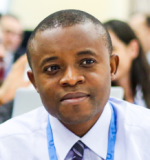
Raymond Onuoha is a Technology Policy Fellow at the Lagos Business School (LBS), where his research focuses on the institutional and policy challenges in the evolution of the digital economy and technology innovation in developing countries, with a focus on sub-Saharan Africa. In this capacity, he is a research consultant to regional think tanks: Research ICT Africa, IT4Change (Canada) and the African ICT Foundation. Raymond was a Doctoral Fellow of the IDRC Research Awards (2018), which aims to build emerging leaders in digital policy in the global South, and a Young Scholar Fellow for the Communications Policy Research South Conference which took place in Mozambique in 2018. He is currently a doctoral candidate at the Nelson Mandela School of Public Governance, University of Cape Town, South Africa, where his thesis interrogates platform competition policy in the multi-sided telecommunications market, and its investment and innovation imperatives for social welfare in developing economies.
Shamira Ahmed

Shamira Ahmed is a seasoned development economist with a versatile skill set and broad research expertise. Shamira has extensive practical experience in implementing international trade and investment agreements, conducting industrial and economic development policy research, economic diplomacy and global governance, and providing technical expertise related to structural economic change, international trade and economic development, and policy implications of the data driven digital economy, on the African continent and the Global South.
Her experience includes: providing data driven insights for an African satellite television service client at a multi-national management consultancy firm; advocating African interests for an equitable trade system as an economic trade advisor, at a national trade department; and, driving evidence based research and technical expertise in her current role as senior economist at Research ICT Africa. She's an Australia Awards Africa Scholarship recipient, she was awarded the Graeme Wilson Leadership Prize , and is part of the African Women in Leadership Network. Shamira has a quantitative economics and econometrics background obtained through a Masters Degree in International and Development Economics from the Australian National University, a BCom Honours in International Trade and Finance, and a BCom in Economics and Econometrics, both from the University of Johannesburg.
Sheena Magenya

Sheena Magenya is a queer African feminist with 15 years of experience working for local, regional and international non-governmental and community based organisations in Namibia, Kenya and South Africa. She is interested in the lives and varied realities of women in Africa and the African diaspora who thrive and exist at the intersection of sexuality, gender, technology, class and culture. She sometimes writes short-form fiction, and enjoys walking and swimming.
Sheetal Kumar

As Head of Global Engagement and Advocacy, Sheetal leads GPD’s global engagement and advocacy portfolio across GPD’s policy areas (Trust and Security, Online Content and Emerging Tech) with the aim of shaping global policymaking processes so that they are more open, inclusive and transparent, and lead to policy outcomes that are human rights respecting. She oversees global advocacy engagement including the development of policy positions, research and scoping, development and delivery of tailored advocacy strategies, training and capacity building of civil society partners and other stakeholders, as well as relationship building and management across GPD’s policy areas.
Sheetal holds an MSc in Media, Communications and Development from the London School of Economics and an MA in International Relations with French from the University of St Andrews. Her studies there included global internet and communications policy, the evolution of the internet, communication for development, media in the global South and, more broadly, theories relating to power, media and communications and technology.
Promoting participatory, inclusive and democratic policy processes and developing effective communication across communities have always been the focus of Sheetal’s work. Before joining GPD, Sheetal worked for the Institute for Environment and Development (IIED). Prior to this, she lived and worked in Senegal for two years where she coordinated communications, provided fundraising support and managed the website for the Senegalese health organisation, Enda Santé. She has also provided support to the Knowledge Management Department of UNESCO West Africa’s regional headquarters, and has worked as a teacher and an editor for the HIV/AIDS charity AVERT. Sheetal speaks English and French.
Sophie Tomlinson
Sophie Tomlinson is the Communications and Outreach Manager of the Internet and Jurisdiction Policy Network. She is an experienced policy professional with a background in technology policy, international trade and development. Sophie previously worked as Deputy Director, Global Policy at the International Chamber of Commerce (ICC) where she led work on sustainable development, digital transformation and stakeholder engagement.
Since joining ICC in 2014, Sophie delivered roles across ICT, digital media, taxation and trade facilitation portfolios. Managing ICC’s digital economy policy work between 2015-2018, Sophie developed policy and communication strategies to advance global business perspective on issues from internet and telecoms, to privacy and data protection as well as cybersecurity, emerging technology and digital trade.
Tatiana Tropina

Tatiana Tropina is Assistant Professor in cybersecurity governance at the Institute of Security and Global Affairs, Leiden University and an Associate Fellow of The Hague Program for Cyber Norms. A lawyer by education, for the last 15 years she has been engaged in academic research, policy, and advocacy in the field of cybercrime, cybersecurity, ICT regulation, and Internet governance.
Tracy Sinkamba Faustin

Passionate about creating connections, networks and building relationships. With over 10+ years' experience at the international level in internal and external senior programme management. Canadian by birth, with Zambian and Guyanese heritage. Prior to joining the I & JPN, she held several European and US-based posts with international development organisations including the International Chamber of Commerce in Paris, France, International Monetary Fund (IMF) and the World Bank Group. She holds an LL.M degree in International and Intellectual Property Law from the University of Buckingham and a BA in English Literature from McGill University. She loves dogs although she doesn't have one yet. Is anyone feeling generous enough to give me one?
Valeria Betancourt

Valeria Betancourt has led APC's Communications and Information Policy Programme (CIPP) since 2010. She is a longtime activist in the field of human rights and the internet, with a special focus on the areas of information and communication technologies for development, access to the internet, human rights in the online sphere, and internet governance in the context of developing countries and the global South. In 2013 and 2015, Valeria was awarded a LACNIC Outstanding Achievement Award and a FRIDA Programme Recognition for contributing to development and the internet in Latin America. Her background is in sociology and political science. She has also undertaken Master's degree work in cultural studies and communication. She lives in Ecuador.
Verengai Mabika

Verengai Mabika is a leader in technology and social innovation. He joined the Internet Society Global Policy team as senior policy advisor for Africa in 2017. A serial entrepreneur he founded three organizations, in 2010: Development Reality Institute (DRI), a social innovation hub behind the catalytic http://www.greenvarsity.org/; the Green Innovations Hub now popularised in 32 Africa countries; and in 2014, co-founded Golix, an African blockchain fintech start-up based in Zimbabwe, now with services in Kenya, Rwanda, Nigeria, Tanzania, Cameron, Uganda and South Africa. In 2013 he co-founded the Internet Society Chapter in Zimbabwe, which is now advising government in setting internet policies and standards. An Ashoka Fellow, Echoing Green Fellow, and a member of the BMW Foundation Responsible Leaders Forum, Verengai supports the Internet Society’s global policy work in Africa, including managing partnerships with African Union Commission, Africa Telecommunications Union, Regional Economic Communities (RECs), Regulators Associations and sub-Regional Internet Governance forums. He also leads the ISOC regional policy work related IoT Security, MANRS, internet governance, internet infrastructure security, online privacy and community networks. Verengai is a blockchain enthusiast and has interests in artificial intelligence and IoT.
Wolfgang Kleinwaechter

Wolfgang Kleinwaechter is a Professor Emeritus from the University of Aarhus in Denmark where he was teaching a master course on Internet Policy and Regulation since 1998. He is also a Commissioner in the Global Commission on Stability in Cyberspace (GCSC).
He is involved in Internet Governance issues since the early 1990s. He was member of the UN Working Group on Internet Governance (2003-2005), appointed by UN Secretary General Kofi Annan, Special Adviser to the chair of the Internet Governance Forum (2005-2010), Nitin Desai, and Special Ambassador of the Net Mundial Initiative (NMI).
